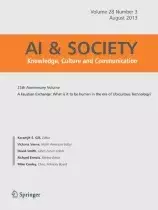
A new paper was published by Anastasia Nefeli Vidaki and Vagelis Papakonstantinou on "Democratic legitimacy of AI in judicial decision-making", in the AI & Society journal (Springer).
The paper is open access.
Abstract
Concerns have been expressed regarding the impact of automation procedures and penetration of new technologies into the judicial field on fundamental rights, democratic values and the notion of legitimacy in general. There are particular risks posed to the legitimate judicial decision-making and the rights of the parties of court proceedings. This paper examines the complex relationship between the artificial intelligence (AI) and the democratic legitimacy of judicial decision-making. While AI systems have been introduced in various areas of public administration to support law application and public policy, their role in the judiciary raises distinct questions about the legitimacy of algorithmic influence on adjudication. Normally, traditional judicial legitimacy is grounded in principles of impartiality, transparency and reasoned justification, which AI systems challenge by potentially disrupting these core democratic tenets. There lies a possibility that biased algorithms will be deployed in justice. The judges and their impartial and independent thinking and reasoning will be crowded out and the judiciary will be gradually replaced by machines reaching a decision based on statistics rather than an individualized assessment. This, not that far-fetched scenario, seems menacing for the whole democratic structure and idea. This paper reviews theoretical perspectives on democratic legitimacy, focusing on the contrasting views of judicial authority as either an undemocratic imposition on political rights or as a consensual safeguard for fundamental rights within a democratic context. Unlike previous studies that examine the raised topics in isolation, this paper provides a comprehensive framework that evaluates the diverse degrees of AI automation and how they affect impartiality, publicity and reasoning. It goes further by exploring its possible threats to those aspects of democratic legitimacy and suggesting some possible solutions to counterbalance them. Despite the doubts over the compatibility between AI and democratic ideals, this paper contributes an innovative hybrid model for judicial decision-making that integrates human oversight with AI assistance, seeking to reconcile the benefits of AI with the need to uphold democratic principles within the judicial review process. This approach aims to fill a critical gap in the current literature by directly confronting challenges and opportunities presented by AI in judicial contexts, with a view to sustaining democratic values in a future where the role of AI in the judiciary is likely to expand.
